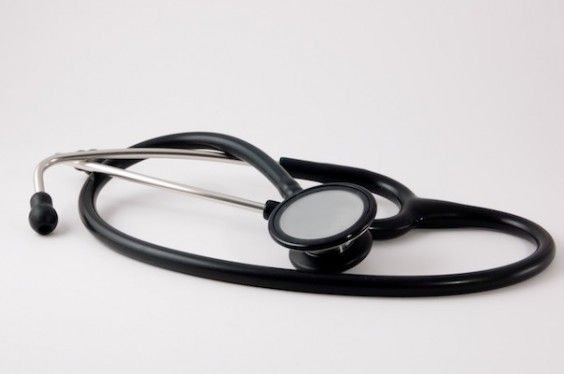Greatist News examines and explains the trends and studies making headlines in fitness, health, and happiness. Check out all the news here.
Do you like obese people?
That question might sound ridiculous, but it’s one whose answer is increasingly, even if subconsciously, “less than you might think.”
Even though few people might be willing to admit their bias against people who are overweight, growing evidence suggests weight stigma is a widespread issue in American societyChanges in perceived weight discrimination among Americans, 1995-1996 through 2004-2006. Andreyeva, T., Puhl, R.M., Brownell, K.D. Rudd Center for Food Policy and Obesity, Yale University, New Haven, Connecticut, USA. Obesity 2008 May;16(5):1129-34.The influence of a defendant’s body weight on perceptions of guilt. Schvey, N.A., Puhl, R.M., Levandoski, K.A., et al. Department of Psychology, Yale University, New Haven, CT, USA. International Journal of Obesity 2013 Jan 8. Epub ahead of print.. And according to new research, even physicians are less empathetic to overweight and obese patientsPhysicians build less rapport with obese patients. Gudzune, K.A., Catherine Beach, M., Roter, D.L. Division of General Internal Medicine, Department of Medicine, Johns Hopkins University School of Medicine, Baltimore, Maryland, USA. Obesity 2013 Mar 20. Epub ahead of print.. These findings point to the importance of explicitly addressing weight bias via interventions that help us confront our own, sometimes secret, prejudices.
What’s the Deal?
News outlets across the globe have jumped to cover a study that found doctors act less empathetic toward obese and overweight patients than they do toward patients who are not overweight or obesePhysicians build less rapport with obese patients. Gudzune, K.A., Catherine Beach, M., Roter, D.L. Division of General Internal Medicine, Department of Medicine, Johns Hopkins University School of Medicine, Baltimore, Maryland, USA. Obesity 2013 Mar 20. Epub ahead of print.. According to the findings, doctors weren’t any less likely to provide medical advice to overweight and obese patients, but they were less likely to develop emotional rapport. Researchers say that’s possibly because doctors hold negative views of overweight and obese people, or have less respect for them.
Unfortunately, these findings aren’t surprising. Over the past few years, multiple studies have indicated that weight bias is present among a range of health professionals, even those who specialize in treating obesity and eating disorders Implicit anti-fat bias among health professionals: is anyone immune? Teachman, B.A., Brownell, K.D. Department of Psychology, Yale University, New Haven, Connecticut, USA. International Journal of Obesity and Related Metabolic Disorders 2001 Oct;25(1):1525-31.Weight bias among dietetics students: implications for treatment practices. Puhl, R., Wharton, C., Heuer, C. Rudd Center for Food Policy and Obesity, Yale University, New Haven, CT, USA. Journal of the American Dietetic Association 2009 Mar;109(3):438-44.Weight bias among health professionals specializing in obesity. Schwartz, M.B., Chambliss, H.O., Brownell, K.D., et al. Department of Psychology, Yale University, New Haven, Connecticut, USA. Obesity Research 2003 Sep;11(9):1033-9..The fact that overweight and obese patients receive less empathy is a big problem, not only because empathy can be a key factor in patients’ motivation to lose weight, but also because heavier patients may be less willing to seek medical treatment (for any ailment) if they feel unwelcomed by their medical providerPhysician empathy and listening: associations with patient satisfaction and autonomy. Pollak, K.I., Alexander, S.C., Tulsky, J.A., et al. Cancer Prevention, Detection, and Control Research Program, Duke University Medical Center, Durham, NC, USA. Journal of the American Board of Family Medicine 2011 Nov-Dec;24(6):665-72..
Why It Matters
At this point, the question isn’t whether health professionals are biased against overweight people; many of them are. Now, we need to figure out how to change those negative beliefs. Unfortunately, studies suggest these beliefs are often subconscious, or implicit, meaning sometimes we don’t even realize we’re biasedThe self-protective nature of implicit identity and its relationship to weight bias and short-term weight loss. Carels, R.A., Hinman, N., Koball, A., et al. Department of Psychology, Bowling Green State University, Bowling Green, OH, USA. Obesity Facts 2011;4(4):278-83. And it’s a lot harder to change the beliefs of someone who won’t even admit they have themA service learning based project to change implicit and explicit bias toward obese individuals in kinesiology pre-professionals. Rukavina, P.B., Li, W., Shen, B., et al. Department of Health Studies, Physical Education, and Human Performance Science, Adelphi University, Garden City, NY, USA. Obesity Facts 2010;3(2):117-26..
The good news is that research has also found that educating people about the harmful effects of weight bias can have positive resultsHow to lose weight bias fast! Evaluating a brief anti-weight bias intervention. Diedrichs, P.C., Barlow F.K. School of Psychology, The University of Queensland, Brisbane, Australia. British Journal of Health Psychology 2011 Nov;16(4):846-61.. Health professionals who participate in these interventions (such as a day-long interactive workshop led by researchers and health promoters) say they’ve become aware of their own biases, and have learned to avoid communicating anti-fat attitudes to patients.
It’s time to make this kind of education a staple of training programs for health professionals, and eventually for people in all fields of work. Past research suggests that weight bias isn’t anything new: More than 10 years ago, research found that even health care professionals were not immuneImplicit anti-fat bias among health professionals: is anyone immune? Teachman, B.A., Brownell, K.D. Department of Psychology, Yale University, New Haven, Connecticut, USA. International Journal of Obesity and Related Metabolic Disorders 2001 Oct;25(1):1525-31.. Having implicit biases against overweight individuals doesn’t make anyone a bad person — it just makes us human. But it’s important to start acknowledging our hidden biases and work to make them disappear.
Have you ever felt your doctor was prejudiced against overweight or obese patients? Let us know in the comments below or tweet the author at @ShanaDLebowitz.

